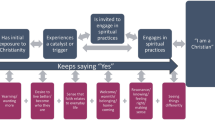Conclusion
Such are the issues that two psychologists with theological training and ministerial ordination draw from social science literature as it relates to religious conversion. Few, if any, of these issues are settled definitively. There is a great need for solid, responsible research, not to prove or disprove, but simply to understand, predict, and, where desirable, control. For these are the goals of science. Before research can be productive, however, these are the goals of science. Before research can be productive, however, there is need for theoretical development. Inadequate conceptualization, especially of necessary distinctions and discriminations, has handicapped the scientific investigation of religion almost as much as a limited tool kit. But the signs of the times regarding social scientific investigation of conversion are hopeful. Especially to be recommended for further research by someone well acquainted with the field of religious conversion is the vast literature in social psychology on opinions, attitudes, and beliefs. Perhaps we can continue the process of knowledge-building that began so promisingly in the first three decades of the century and then stopped on a plateau.
Similar content being viewed by others
References
Festinger, L.; Riecken, H. W.; and Schachter, S.,When Prophecy Fails. Minneapolis, University of Minnesota Press, 1956.
Sargant, William,Battle for the Mind. Garden City, N. Y., Doubleday & Co., 1957.
Windemiller, Duane A., “The Psychodynamics of Change in Religious Conversion and Communist Brainwashing: With Particualr Reference to the 18th Century Evangelical Revival and the Chinese Thought Control Movement.” Unpublished doctoral dissertation, Boston University, 1960.
Hiltner, Seward, and Rogers, William R., “Research on Religion and Personality Dynamics,”Research Supplement to Religious Education, July–August, 1962, S. 134.
Jahoda, Marie,Current Concepts of Positive Mental Health. New York, Basic Books, 1959.
James, William,The Varieties of Religious Experience. New York, The Modern Library, 1902.
Freud, Sigmund, “A Religious Experience,”Collected Papers, Vol. V. London, Hogarth Press, 1950, pp. 244–245.
Salzman, Leon, “The Psychology of Religious and Ideological Conversion,”Psychiatry, 1953,16, 183–187.
Erikson, Erik H.,Young Man Icutber. New York, W. W. Norton, 1958.
Arlow, J. A., and Brenner, C.,Psychoanalytical Concepts and the Structural Theory. New York, International Univ. Press, 1964; Gill, M. M., and Brenman, M.,Hypnosis and Related States. New York, International Univ. Press, 1961; Schafer, R., “Regression in the Service of the Ego.” In Lindzey, G., ed.,Assessment of Human Motives. New York, Grove Press, 1960, pp. 119–148.
Allport, Gordon W.,The Individual and His Religion. New York, Macmillan, 1950.
Sweet, W. W.,Revivalism in America. New York, Scribner, 1945.
Yang, C. K.,Religion in Chinese Society. Berkeley, University of California Press, 1961.
Sargant,op. cit..
Starbuck, Edwin D.,The Psychology of Religion. New York, Scribner, 1900, p. 364; Coe, George A.,The Spiritual Life. New York, Eaton & Mains, 1900, p. 139; Kildahl, John P., “The Personalities of Sudden Religious Converts,”Pastoral Psychology, 1965,16, 37–44.
Salzman, Leon, “Types of Religious Conversion,”Pastoral Psychology, 1966,17, 8–20.
Ibid., pp. 18–19.
Freud,op. cit..
Salzman, “Types of Religious Conversion,”op. cit., p. 19.
Johnson, Paul E.,Psychology of Religion, rev. ed. Nashville, Abindon, 1959; p. 127.
Drakeford, John W.,Psychology in Search of a Soul. Nashville, Broadman, 1964, p. 261; Yoder, Deon,Nurture and Evangelism of Children. Scotdale, Pa., Herald Press, 1959.
Ferm, Robert,The Psychology of Christian Conversion. Westwood, N. J., Fleming Revell, 1959, p. 218.
Jung, Carl G.,Modern Man in Search of a Soul. New York, Harcourt, Brace, 1933.
Hiltner, Seward, “Toward a Theology of Conversion in the Light of Psychology,”Pastoral Psychology, 1966,17, 35–42.
Erikson, Erik H.,Insight and Responsibility. New York, W. W. Norton, 1964.
Herr, Vincent V., S.J.Religious Psychology. Staten Island, N. Y., Alba House, 1965.
Freud,op. cit., “Types of Religious Conversion,”Pastoral Psychology, 1966,17, pp. 18–19.
Solomon, P., et al.,Sensory Deprivation. Cambridge, Harvard University Press, 1961.
Alland, A., “Possession in a Revivalistic Negro Church,”Journal for the Scientific Study of Religion, 1962,1, 204–213.
Sherif, M., “Group Influences upon the Formation of Norms and Attitudes,”Readings in Social Psychology, 3d ed.; Maccoby, Newcomb, and Hartley, eds., New York, Holt, Rinehart and Winston, 1958; Asch, S. E., “Opinions and Social Pressure,”Scientific American, 1955,193, 31–35.
Leary, T., “Religious Experience: Its Production and Interpretation,”Dialog, 1964,3, 215–220.
Hordern, W., “Theological Critique of the Psychedelic Experience,”Dialog, 1964,3, 220 ff.
Allport, Gordon W., “Mental Health: a genetic attitude,”Journal of Religion and Health, 1964,4, 7–21.
Berelson, Bernard, and Steiner, Gary A.,Human Behavior: An Inventory of Scientific Findings. New York, Harcourt, Brace and World, 1964. See chapter on opinions, attitudes, and beliefs.
Rights and permissions
About this article
Cite this article
Scroggs, J.R., Douglas, W.G.T. Issues in the psychology of religious conversion. J Relig Health 6, 204–216 (1967). https://doi.org/10.1007/BF01532239
Issue Date:
DOI: https://doi.org/10.1007/BF01532239



